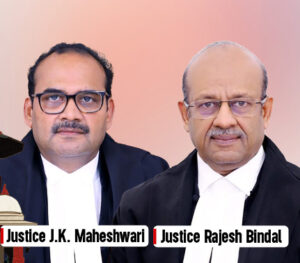SC Strikes Down Tripura Govt’s Cancellation of Recruitments; Says Executive Instructions Cannot Override Statutory Rules
In a ruling that underscores the supremacy of statutory recruitment rules over executive policies, the Supreme Court on Thursday quashed the Tripura government’s decision to scrap ongoing recruitment processes midway and replace them with a fresh drive under the New Recruitment Policy, 2018 (NRP). The apex court held that such cancellation, done without sufficient justification, amounted to an arbitrary exercise of power and violated Articles 14 and 16 of the Constitution.
Cause Title: PARTHA DAS & ORS. VERSUS THE STATE OF TRIPURA & ORS. (and connected case)

A bench of Justices J.K. Maheshwari and Rajesh Bindal delivered the verdict while hearing appeals filed by candidates whose selection processes were stalled midway. The petitioners included aspirants for posts of Enrolled Followers in the Tripura State Rifles (TSR), Inspector of Boilers, and Tripura Civil Service/Police Service (TCS/TPS) Grade-II officers.
The Controversy: From Ongoing Selection to Cancellation
Recruitments for these posts had been initiated under statutory frameworks such as the TSR Act and Rules, as well as service rules governing civil and technical appointments in the state. Written examinations and selection stages were already at advanced levels when, in 2018, the Tripura government notified the NRP, seeking to centralize and standardize recruitments.
Pursuant to the NRP, the government issued abeyance and cancellation memoranda that abruptly scrapped ongoing processes and declared that all future recruitments would be conducted afresh under the new scheme. This left hundreds of candidates, many of whom had cleared multiple stages, in limbo.
Challenging the decision, the candidates argued that their legitimate expectations of a fair and timely conclusion to the recruitment were defeated by the arbitrary action of the State.
Court’s Observations: Executive Power Has Limits
In a strongly worded judgment, Justice Maheshwari (writing for the bench) reiterated the principle that executive instructions cannot override statutory rules.
“Executive instructions issued under Article 166(1) of the Constitution of India cannot override the act done under the statute and the rules made thereunder. The Executive instructions can only supplement the act and rules through which recruitment process was carried out, but it cannot supplant the specific provisions which already occupy the field.”
The Court rejected the State’s contention that cancellation was necessary in the “larger public interest.” Such a vague claim, it held, did not meet constitutional standards of fairness and equality.
“Merely suggesting that a decision to keep an ongoing recruitment process in abeyance and its subsequent cancellation was in the larger public interest, is not sufficient. The burden is on the State to justify the decision on the anvil of Articles 14 and 16 of the Constitution of India… In our considered opinion, the State has miserably failed in discharging such burden.”
Legitimate Expectation and Rule of Law
The bench stressed that candidates who undergo selection processes initiated under law acquire a legitimate expectation that the process will not be derailed without sound reasons.
“Candidates who have taken part in a recruitment process conducted by a public authority have a legitimate expectation that the selection process will be conducted fairly and without arbitrariness. Consistency and predictability are important aspects of non-arbitrariness, and the rule of law obligates the State to only take decisions which are rooted in fairness and equality.”
The Court observed that the government had not merely withheld appointments against a few vacancies but had “done away with the recruitment process altogether.” Such a decision, it emphasized, cannot be left to the whims of the executive.
Directions to the Tripura Government
Allowing the appeals, the Court issued specific timelines to conclude the stalled recruitments:
Enrolled Followers in TSR and Inspector of Boilers – recruitment to be completed within two months.
TCS/TPS Grade-II services – recruitment to be completed within four months.
It directed that these selections must be concluded strictly under the rules in force at the time the advertisements were issued, and not under the NRP.
Significance of the Judgment
The decision is significant for several reasons:
Reasserts the supremacy of statutory rules over executive schemes in matters of public employment.
Protects candidates’ legitimate expectations, ensuring that recruitment once initiated under law cannot be arbitrarily derailed.
Clarifies limits of “public interest” arguments, holding that vague assertions cannot justify cancellation of recruitment exercises.
Provides relief to hundreds of candidates in Tripura who had been waiting for years due to policy shifts.
Legal observers note that the judgment sends a clear signal to state governments that executive convenience or policy changes cannot retrospectively nullify recruitment processes initiated under law, unless backed by strong, constitutionally valid reasons.
Counsel for the Parties
The appellants were represented by Mr. Pallav Shishodia, Senior Advocate, along with Dr. Lokendra Malik, Mr. Ajit Pandey, Mr. Danish Zubair Khan (AOR), and others.
The respondents were represented by Mr. R. Balasubramanian and Mr. P.V. Dinesh, Senior Advocates, assisted by Mr. Shuvodeep Roy (AOR), Mr. Deepayan Dutta, Ms. Syed Nazarat Fatima, and others.
Conclusion
By quashing the Tripura government’s decision and directing completion of recruitments, the Supreme Court has reaffirmed that fairness, consistency, and adherence to statutory rules are non-negotiable pillars of public employment. The ruling ensures that the long-stalled recruitment for TSR, Boilers Inspector, and TCS/TPS Grade-II posts will now be carried to conclusion, bringing relief to aspirants and clarity to the recruitment framework in the state.
With inputs from Live Law
|Also Read : Tripura Emerges as Top Performer in Energy Efficiency Among Small States |
|Also Read : Recruitment Process Carried Out As Per Statute Can’t Be Arbitrarily Scrapped Midway Through Govt Order : Supreme Court |













